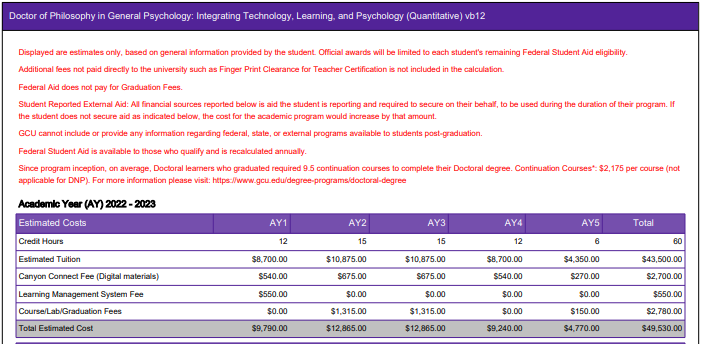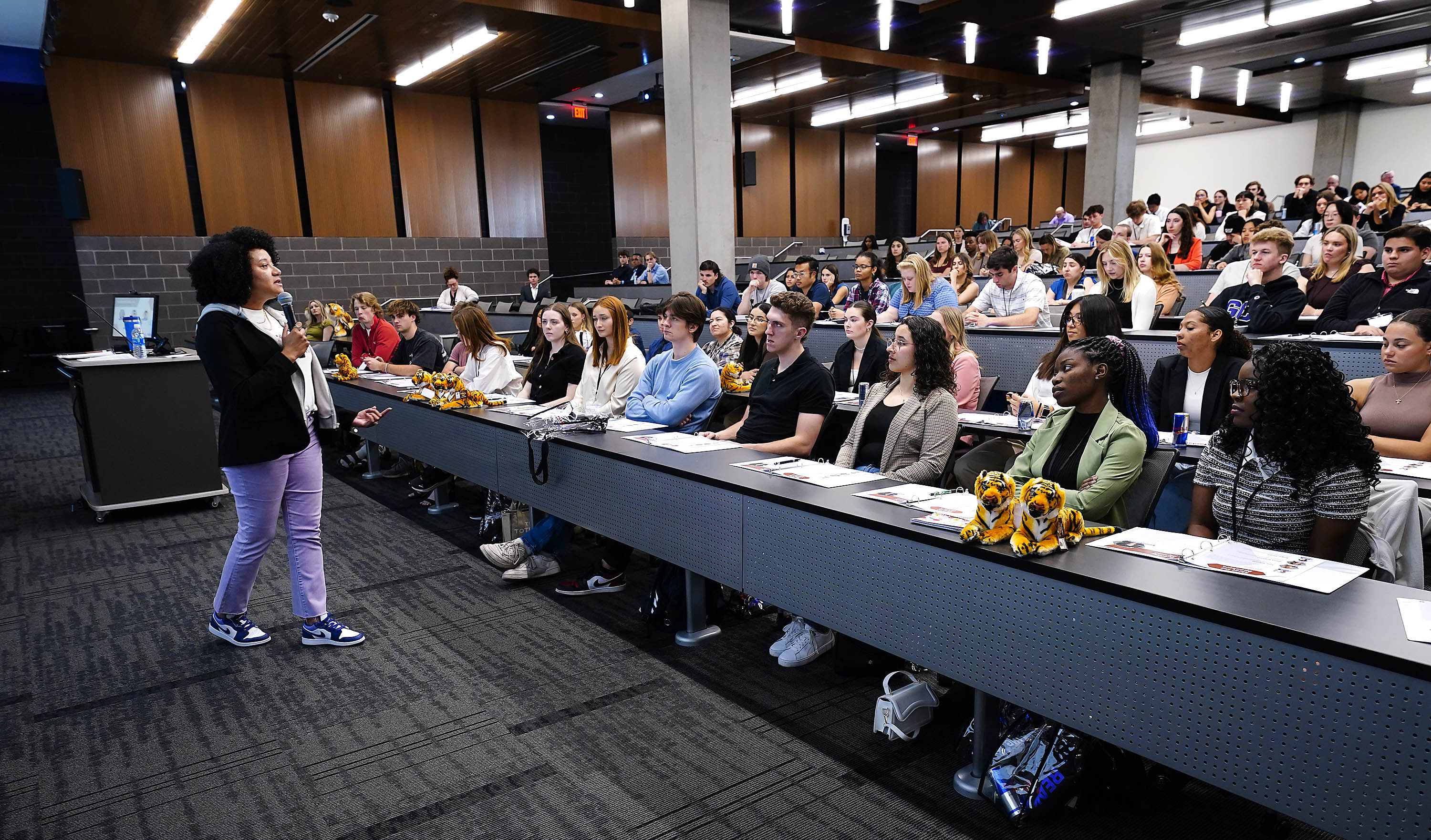Federal officials coordinating efforts with frivolous accusations in order to bring harm to largest Christian university in the country.

Government officials associated with the U.S. Department of Education (ED), Federal Trade Commission (FTC) and under the authority of the Department of Veterans Affairs (VA) are coordinating efforts to unjustly target GCU in what appears to be retaliation for the university filing an ongoing lawsuit against ED regarding its nonprofit status. While such accusations may sound extraordinary, the facts in this document make clear that this is occurring at an alarming level for government agencies to be taking against the largest Christian university in the country.
BACKGROUND ON GCU, NONPROFIT STATUS
GCU was a nonprofit institution from its inception in 1949 until 2004, when it partnered with private investors in order to avoid closing and gain access to capital to grow the university. The university returned to its historic 501(c)(3) tax-exempt Arizona nonprofit status in 2018, which has been recognized by the IRS, Higher Learning Commission, State of Arizona, Arizona Private Postsecondary Board and NCAA Athletics. ED, however, has refused to acknowledge GCU’s nonprofit status for purposes of federal student financial aid. After trying to work cooperatively with ED both before and after the nonprofit transaction to find a solution, GCU was forced to file a lawsuit in February 2021 when it became apparent ED was unwilling to work with us in good faith and there was no path forward. That litigation remains active and ongoing today.
By intentionally mis-classifying GCU as a for-profit institution for purposes of federal student aid, ED is now able to target the university as part of a coordinated effort – outlined in this October 2021 statement from the FTC – to “pursue the full range of sanctions” against for-profit institutions that they frequently decry as bad actors due to the disproportionate number of Americans who attended those schools and then defaulted on federal student loans. GCU does not fit this profile because 1) it is legally a nonprofit entity, and 2) its high-quality students consistently have lower loan default rates than the national average at nonprofit universities. Yet, we believe GCU is still being targeted by these agencies in an unprecedented manner for a regionally accredited 501(c)(3) designated nonprofit university. The allegations, spelled out below, refer to practices that are common in higher education, yet we know of no other traditional university that has received this level of scrutiny. Further, GCU provides higher levels of transparency than is legally required and is considered a leader in higher education transparency, making it nonsensical that they would seek to impose penalties against a university that is going above and beyond what is required.
COORDINATED ACTIONS TAKEN VS. GCU AND ITS EDUCATION PARTNER
Since GCU filed its lawsuit, these agencies have swamped the university and its education partner with broad requests for voluminous amounts of information and records about our operations – the scope of which made it clear these requests were part of a broad fishing expedition to find issue with the university. Nevertheless, with nothing to hide, GCU and its education partner invested thousands of staff hours and millions in legal costs to work collaboratively and comply with the requests. After these comprehensive reviews, the only “findings” these agencies have shared with us are seemingly minor in nature yet they attach labels such as “substantial misrepresentations” or “deceptive and misleading” in an effort to taint the university as a bad actor when all available evidence is to the contrary.
First, GCU categorically denies these unsubstantiated allegations and will take all measures necessary to refute them. Second, GCU does not mislead or deceive students. In fact, the opposite is true as it relates to the levels of transparency and service levels provided by the university. The actions being taken are summarized in the bullet points below, with more details included further below in this statement.
- The AZ Veterans Services State Approving Agency (AZ SAA), which is delegated oversight functions related to veterans education benefits by the U.S. Department of Veterans Affairs (VA), issued a finding earlier this year that claimed two innocuous statements in GCU’s advertising – “Cybersecurity experts are in high demand” and “Every company needs cybersecurity” – were somehow “erroneous, deceptive or misleading” even though such comments are 1) common sense, 2) prevalent in marketing efforts among institutions in higher education, and 3) supported by the Government’s own data. It is our belief the SAA was unduly influenced by the U.S. Department of Veterans Affairs, in conjunction with other federal agencies, to conduct and carry out a risk-based audit in this manner rather than the audits it has performed in the past in which the University has received stellar reviews. GCU strongly rejected and disputed the claims in the audit and after detailing the extensive processes to ensure the validity of its statements in marketing and advertising communications, the SAA – with whom GCU has had a long-standing positive regulatory relationship – was satisfied with GCU’s response and took no further action.
- ED followed that up by sending GCU a notice that it had found “substantial misrepresentations” regarding the cost to complete a doctoral degree at the university and has stated its intent to levy a fine – despite the fact that GCU actually provides more transparency regarding the estimated cost of the programs than is legally required and we believe our disclosures are more robust than other universities. These unsubstantiated claims, which ED has confirmed are not based on any student complaints but rather their own subjective opinion, have not been finalized as yet but they lack merit on multiple levels and have already been refuted twice by federal district and appellate courts in Young v GCU, which rejected the claim that GCU’s disclosures of doctoral program requirements misrepresented the time or cost it would take a student to complete a doctoral program. As we’ll detail further below, this continues a disturbing pattern in which ED has repeatedly substituted its own biased opinion for that of other experts as it relates to GCU.
- ED is also in the process of conducting a multi-year program review of GCU’s administration of federal student aid programs. After a comprehensive review, ED claimed that the posting of an online student’s bio on the first day of class was not considered an act of “academic-related activity” for federal financial aid purposes – even though ED’s Office of General Counsel confirmed to us, in writing, in 2012, that the postings at issue met that requirement. The university strongly disputed ED’s conclusion but nonetheless ED demanded that GCU review every student file for an eight-year period from July 1, 2014 to June 30, 2021, forcing the university to expend more than 3,500 staff hours to date, as well as engaging an outside auditing firm at considerable expense, to certify the results of the file review. ED has refused to engage GCU’s requests to make reasonable adjustments to the scope of this demanded file review. Further, these student bio postings were not cited as an issue in ED’s program review in 2014, yet they are now bringing it up nine years later.
- The FTC is in the midst of an investigation involving GCU’s education services provider, Grand Canyon Education (GCE), which provides marketing, recruitment and other support services to the university. Although this investigation began similar to the investigations by the SAA and ED with large information requests sent to both us and GCE about the operations of the two entities, we have been informed by our partner that they believe the FTC is seemingly focused on phone calls GCE makes on our behalf to prospective students. GCE does not make cold calls to prospective students, only reaching out to those who have inquired about GCU’s programs or otherwise expressed interest in attending GCU. Nonetheless, the federal agency has requested voluminous information, data, and documents about phone calls made to these prospective students in which the prospective student approved the university to contact them. To be clear, calls to prospective students between the time interest is first expressed and when they ultimately begin their program of study or attend elsewhere are not uncommon in higher education, but we are not aware of another nonprofit university that has been subject to this type of review. The calls at issue represent a very small percentage of the total calls GCE makes on our behalf (roughly 2%) and to the best of our knowledge, the FTC has not received complaints about these calls. GCE expressly denies any wrongdoing and will vigorously contest any proposed civil penalty.
To be frank, the substance of these claims is so frivolous that they could have easily been resolved in a 10-minute phone call had the agencies chosen to do so. We would have disagreed with the agencies’ conclusions but believe a reasonable accommodation could have been reached in each case in a spirit of cooperation. Instead, the agencies have chosen to, quite literally, make a federal case out of what should be minor disagreements. Further, if GCU actually intended to deceive students as is being suggested, why would we be investing millions of dollars in technology and taking steps that provide greater levels of transparency than is required? ED requires that universities provide cost estimates only for the first year in college for first-year, first-time students, and only for undergraduate programs. GCU goes beyond these requirements by providing cost estimates for each year of the program of study and for all of its degree programs, including those at the doctoral level. This is more difficult to provide for doctoral programs due to the unique nature of a dissertation, as discussed below. So GCU provides cost estimates for the required course work and explains that students will likely need to take additional “research continuation courses” until they complete a dissertation. GCU does this because it cares about treating all students with honesty and fairness.
GCU ADDRESSING REAL ISSUES OF HIGHER EDUCATION
The substance of these claims makes it clear that something more coordinated and agenda-driven is occurring in an attempt to damage the reputation of a university that has created an innovative and nontraditional model to successfully address the challenges facing higher education today and is extremely important to the State of Arizona.
- GCU has frozen tuition costs on its ground campus for 15 straight years to ensure private Christian education is affordable to all socioeconomic classes.
- GCU students, as exemplified by their cohort loan default rates, are paying back their loans at rates better than the national average.
- On average, GCU bachelor students graduate with significantly less debt than students at other private universities and about the same as heavily subsidized state universities, according to the College Board.
- Parent PLUS loan debt incurred by GCU families is half the amount of highly subsidized state universities in Arizona.
- GCU invested millions of dollars in student support services and automated technology to provide greater levels of transparency than is legally required.
- Enrollment has grown to an estimated 25,800 students on the ground campus and 92,000 online.
- GCU produces roughly 30,000 graduates annually and is taking significant and large-scale steps to address critical workforce shortages in areas such as teaching, nursing, counseling, technology, engineering, etc.
- GCU has a low Title IV 90/10 revenue percentage (65.5%) and strong gainful employment numbers in comparison to other universities with similar student bodies.
- More students are choosing to use their federal government-provided grants and student loan dollars at GCU than any other university in the country.
- Because of low tuition rates that make higher education accessible to all socioeconomic classes, GCU has a very diverse student body.
- GCU is supporting its surrounding community through millions of dollars in investments in its groundbreaking five-point plan.
Rather than applaud such efforts or get a better understanding of why so many students are choosing GCU (as many in higher education have done), individuals in the federal government – for reasons we do not understand – have instead chosen to impose unprecedented levels of scrutiny aimed at GCU. We believe in common sense government oversight that should apply to all universities but not aggressive government overreach and we believe these claims are just that. It is clear that GCU, despite all of the positive outcomes benefitting our students and the community, has become their primary target.
LACK OF CORROBORATING EVIDENCE
These coordinated accusations are not corroborated by any other organization that provides oversight to GCU to indicate that the university is some sort of problem in higher education, including the IRS, our institutional accrediting body (Higher Learning Commission), state regulatory agencies, Arizona Corporation Commission, NCAA Division I Athletics and the 19 other program-specific accrediting bodies that provide approvals for our academic programs. GCU receives high marks in those reviews and our various grants of accreditation have routinely been extended for the maximum time period allowed. In fact, GCU is looked at by many of its peers as a leader in higher education transparency and its staff members have been asked to present our industry-leading best practices at seven high-profile conferences in order to share their expertise with other higher ed administrators. GCU also has contracts with almost 5,000 public and private partners, none of whom have ever expressed concern about a perceived “misrepresentation” or “deception.”
Most importantly and in direct contrast to these agencies claims, during the Higher Learning Commission's latest comprehensive review of GCU in 2021, their final report included the following: “Their recruitment and marketing materials are clear and transparent, and financial information presented to students throughout the student lifecycle is robust.” Specific to a prospective doctoral student’s experience, HLC stated: “The information and resources provided are robust and thorough, providing prospective students a clear picture of their academic and financial path toward a degree at GCU.”
MORE EVIDENCE OF TARGETING
The irony in these reviews, especially as it relates to ED’s accusations, is that a 2022 report by the U.S. Government Accountability Office (GAO) found that 91% of colleges in America have misleading information or understate the net price in their financial aid offers to prospective students. That includes 41% of colleges that do not even provide a net price in their offers to students. GCU provides greater levels of transparency than is legally required and is looked at by its peers as a leader in higher education transparency – yet these government agencies have chosen to single out GCU and threaten punitive actions in order to harm the university.
Specific to ED’s claims regarding GCU’s disclosures related to its doctoral program, we shared with ED examples of well-respected universities’ disclosures in which we believe GCU’s information was more robust. In a number of these examples, the universities marketed their doctoral programs as three years in length even though they too have dissertation requirements that often extend the time and cost of the program. To our knowledge, none of those institutions have received any type of scrutiny from ED.
Specific to the VA/SAA’s claims regarding GCU’s advertising statements, 17 of the top 23 undergraduate cybersecurity programs in the U.S. News and World Report rankings have made similar statements about a variety of their cybersecurity programs. To our knowledge, none of those well-respected institutions have received any type of review of their advertising claims by the VA.
FURTHER DETAILS OF ED INQUIRY
There are four significant aspects of ED’s allegations that GCU has made “substantial misrepresentations” regarding the cost to complete a doctoral program – which relates to a population comprising less than 5% of GCU’s student body.
- As stated above, GCU provides further transparency than is legally required by providing costs estimates for students for each year of the program of study and for all of its degree programs. Each student also has an assigned counselor providing repeated and regular academic and financial assistance during the admission process and throughout their academic program.
- Although not required by federal regulations, GCU created its own Degree Program Calculator (DPC) to provide students with the estimated costs of their program. It factors in previously completed college courses from a student’s transcripts and calculates estimated costs for each year of the program, including costs for credit hours and other fees. All other regulatory bodies and third parties that have learned about this process/technology have praised it.
The DPC calculation is simpler for bachelor’s and master’s degrees, which have a fixed number of course requirements. Doctoral degrees are unique in that there is usually not a fixed cost because learners must write and do research for a dissertation to complete the program. Students who complete the 60 required credits, but have not finalized their dissertation, take continuation courses overseen by doctoral faculty while they continue their work on their dissertation, as is a common practice in higher education. The time it takes to complete a dissertation is unique to each Doctoral candidate and there are many variables that affect the amount of continuation courses they may need to take. As this tool was created for all students -- bachelors through doctoral -- GCU’s automated Degree Program Calculator provides the total estimated cost for the 60-credit doctoral program just as it does for other degree programs. In order to be as transparent as possible, GCU also includes (just above the table, in the same size font but in red type in order to bring attention to it) both the average number of continuation courses and the cost per continuation course that our students may need to complete a dissertation.
The Degree Program Calculator is the most prominent place GCU can make such a disclosure, and all students who started in doctoral programs at GCU since 2018 received the Degree Program Calculator estimates and/or acknowledged receiving a copy of the University Policy Handbook with tuition and fee tables. ED has characterized the DPC as “deceptive” because of the reference to “total estimated cost” in the templated text of the disclosure. As the sample DPC below shows, this total price references the 60-credit requirement and GCU makes clear in the DPC and other disclosures that there are additional continuation courses and costs that will vary for each student.

GCU has numerous other disclosures, both written and verbal, that reiterate the variance in the time it might take a student to complete a doctoral degree, including within three sections of the application (1. enrollment agreement, 2. signature release, 3. doctoral acknowledgment form or about doctoral programs at GCU form), information sessions, webinars, in-person Destination GCU events, videos such as this one from GCU’s dean of the College of Doctoral Studies, and welcome calls from Student Service Counselors. This creates a cumulative net impression that makes the financial path toward a degree clear, which both the federal courts and Higher Learning Commission have acknowledged. ED concedes that GCU discloses that continuation courses will add to the time and courses required for completion but claims that doctoral candidates (who all hold at least a master’s degree) could assume there is no additional cost for these courses since the price for each of these continuation courses is not listed in each of these other places.
Because the Department was calling GCU doctoral students seeking information (which the Department has refused to share with GCU) to support its allegations, our outside legal team also made calls and shared a number of these students’ experiences with the Department. Doctoral students stated GCU was upfront with them on the cost and likelihood of continuation courses. As one student declared in a signed statement, “Anyone who thinks that GCU creates an expectation that a student will complete in 60 credits or 3½ years was not paying attention to GCU’s disclosures.”
- In Young v. GCU, both the district court and Eleventh Circuit Court of Appeals dismissed claims made by a plaintiff that essentially mirror misrepresentation claims ED is seeking to impose, concluding that GCU did not represent that a student could expect to complete their program in a given time or cost. ED claims it can ignore the findings of the Eleventh Circuit because the court’s ruling focused on representations about the number of courses while ED is focused on representations about the cost. Those are merely semantic arguments made to justify ED’s rejection of the common-sense findings of the reviewing courts. Indeed, the plaintiff in that case sought recovery of the cost of the courses. Moreover, ED’s attempt to distinguish the case requires the untenable belief that graduate students do not understand that enrollment in courses requires payment of tuition.
- ED’s decision to ignore the totality of the court’s conclusions in Young v GCU is yet another glaring example in which it has ignored or disregarded expert analysis from other entities and instead substituted its own biased opinions as they relate to GCU.
When ED was evaluating GCU’s 2018 transaction in which it returned to its historic nonprofit status, it disregarded the transfer pricing study and fairness opinion – which it requested – of two nationally recognized, highly respected, independent accounting/finance firms that concluded both the purchase price of the transaction and the terms of its master services agreement with its primary contractor were fair market value and beneficial to GCU. ED instead substituted its own conclusion that it would not benefit GCU. We now have five years of factual evidence and audited financial statements that make it abundantly clear the nonprofit transaction was both fair and has greatly benefitted GCU and its students, who are thriving despite all of these actions by ED.
In its ultimate decision to refuse to acknowledge GCU’s nonprofit status, ED abandoned its long-standing precedent of accepting the IRS’ determination of nonprofit status as it had done previously with other similar conversions, and again substituted its own opinion about nonprofit law as it relates to GCU.
FURTHER DETAILS OF ED PROGRAM REVIEW
In April of 2021, ED commenced a wide-ranging program review to evaluate GCU’s administration of federal student aid programs. ED began the program review with a voluminous information request for documents and policies, and conducted two days of interviews with GCU staff. The stated focus of the program review was to examine GCU’s adherence to ED’s requirements beginning July 1, 2019 and ending June 30, 2022. Ultimately, the ED program reviewers expressed concerns over whether GCU could consider a student’s post in an online forum built exclusively for an online course to be evidence that the student was actively engaged in the online course. The posts questioned by ED consisted of personal statements intended to introduce the student and sharing details about their personal background that went to faculty and fellow students at the beginning of an online course. During a previous Program Review this same concern was discussed and ultimately ED concluded the students’ posts met the criteria for active engagement. In fact, as part of that review GCU received an email from ED’s Office of General Counsel (OGC) in 2012 that the student postings at issue were sufficient evidence of academic engagement. GCU’s staff provided the written OGC guidance it had received to the ED program review team, which should have resolved the matter. Instead, ED claimed that its rules had changed in 2011 and that the general counsel’s guidance was no longer valid. However, the email from the OGC came in 2012 – after the purported “rule change” guidance appeared to reflect ED’s then-current interpretation. In other words, ED takes the position that the university should have known that the guidance provided by the OGC was not to be relied on going forward. The university strongly disputed ED’s conclusion but nonetheless ED issued its preliminary finding, demanded that GCU undertake the arduous process of reviewing every student file for the aforementioned eight-year period, and ignored GCU’s requests to make reasonable adjustments to the scope of this demanded file review even though the university has repeatedly told ED that the difference would be small.
In addition to the express ED approval GCU received regarding these posts, two other aspects illustrate the absurdity of such a claim. First, quality online academic programs such as GCU’s are built around interaction among students in academic discussion forums, project-based assignments in which students work collaboratively with one another, and student engagement in daily discussions about course content. Understanding the background of your classmates is the first step in this interactive process. Second, questions about academic requirements are typically handled by programmatic accrediting bodies, not the U.S. government, and GCU has a stellar record with its accrediting bodies.
FURTHER DETAILS OF VA INQUIRY
The Arizona State Approving Agency of the VA has given GCU glowing reviews in its audits for many years, even telling us we are a model institution that should be training other universities in how to handle processes related to the education of military veterans. Yet, in its most recent review of the university, the SAA examined GCU’s marketing efforts and sent us a finding that they considered two statements in our advertising to be “erroneous, deceptive or misleading” – allegations that mirror the language used by federal agencies in their inquiries that were used to shut down or penalize universities such as ITT Technical Institute and DeVry. It is our belief the SAA was unduly influenced by the U.S. Department of Veterans Affairs, in conjunction with other federal agencies, to conduct such a risk-based audit in this manner.
Here are the two statements in GCU’s advertising that were deemed “erroneous, deceptive or misleading”:
- “Cybersecurity experts are in high demand.”
- “Every company needs cybersecurity.”
First and foremost, as we pointed out in our reply, those general statements are obviously true as it relates to the labor market for skilled workers in the cybersecurity field, as data from the U.S. Bureau of Labor Statistics validates. The inference that these statements create some sort of purported “urgency to enroll” is illogical and the SAA/VA produced no support that it promulgated any type of aggressive recruiting. No reasonable person would come to the same conclusions as the SAA/VA when looking at the above statements. And, in fact, such verbiage is common in advertising by institutions in higher education. As stated above, when reviewing U.S. News and World Report’s Best Undergraduate Cybersecurity programs, 17 of the 23 universities listed among America’s best made similar claims about a variety of their cybersecurity programs.
This does not warrant a VA finding, which is both legally and factually inaccurate, and GCU refused to sign a statement acknowledging these statements were improper. After GCU detailed the extensive approval process it already has in place to ensure factual statements in its marketing and advertising communications are supported by a reasonable basis, the Arizona State Approving Agency – with whom GCU has had a long-standing positive regulatory relationship -- was satisfied with GCU’s response and the safeguards that are in place.
IN CLOSING
GCU’s innovative approach to higher education has allowed it to go from an institution on the brink of closing to becoming the largest private Christian university in the country. It has become an American success story because it has focused on providing academic programs in creative delivery formats to help a greater percent of the population access higher education in order to meet their career and life goals.
Now, for political or ideological reasons we don’t understand, some in our federal government want to undermine those efforts. While we have taken the high road and continuously worked cooperatively and professionally with these individuals over the past five years, given their clear motivations and recent actions, we can no longer stay silent and allow their coordinated efforts to impugn the reputation of this university and the many faculty and staff who go above and beyond to ensure we provide the best possible service to our students.
These federal inquiries are being done under the guise of “consumer protection.” Enrollment is growing at GCU with an estimated 118,000 students this fall, a market-based response which happens only if students are happy with the education and services they are receiving. The reality is that these agencies’ reviews are actually hurting consumers (i.e., GCU students) because the university has had to spend thousands of staff hours and millions of dollars in legal fees in order to address these agencies’ unprecedented actions. Thus far, GCU has been able to absorb those costs and continue to freeze the cost of tuition, which it has done on its ground campus for 15 straight years. But, because GCU, like almost all private universities, is dependent on tuition as a primary revenue stream and does not receive state funding like state universities, the university may be forced to raise tuition if the legal fees or fines associated with these actions continue to escalate. We are, in essence, trying to protect our students from this government overreach.
GCU is asking for 1) the Department of Education to recognize the university’s lawful nonprofit status just as other regulatory agencies have done, and 2) these targeted actions to stop.














































